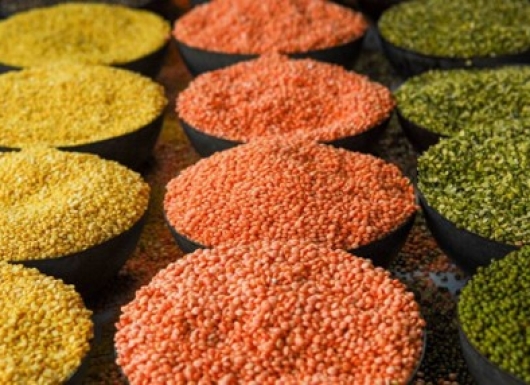Submitter: (ICARDA)
ICARDA and its partners have successfully developed and deployed lentil varieties that are super early and ideal for the sustainable intensification of fallow lands, as they can avoid the terminal drought. These varieties are high-yielding (1.5 to 2 tonnes/ha) and biofortified with high levels of iron (73–114 ppm) and zinc (51–65 ppm), contributing to improved nutritional security, particularly among women and children who are most vulnerable to micronutrient deficiencies.
These varieties, such as IPL 220, Pusa Vaibhav, and Pusa Ageti Masoor in India, are widely adopted by farmers and have accounted for 41% of the total breeder seed production for lentils in the country over the past five years, demonstrating strong potential for scaling.
Bangladesh, the varieties are BARI Masur-2, 4, 5, 6, 7, 8, and 9, as well as BINA Masur 7 and 10. These varieties are high-yielding and also contain more than 18% and 44% higher Fe and Zn in their grains, such as BARI Masur 4, which has a high Fe and Zn content. In Nepal, the varieties RI4 and Khajura Masuro 4 are widely adopted by the farmers.

Key features:
Benefits:
Existing and potential targets include- India (Madhya Pradesh, Chhattisgarh, Bihar, Jharkhand, Assam, Odisha, Tripura, Rajasthan, and Uttar Pradesh), Bangladesh, Nepal, Afghanistan, Morocco, Myanmar, Ethiopia, Sudan, Kenya, and Turkey
Farmers have widely adopted IPL 220, Pusa Vaibhav, and Pusa Ageti Masoor. Over the past five years, they have accounted for 41% of the total breeder seed production for lentils in the country, demonstrating strong potential for scaling. These innovations are deployed across approximately 75,000 ha in India and 1,50,000 ha in Bangladesh. In Nepal, 60% of lentil farmers have adopted these varieties, resulting in an additional 1.5 million tons of lentil production and an annual income of approximately US$29 million.
These innovations have demonstrated potential for widespread adoption over the past few years.
Dr. Shiv Kumar Agrawal: sk.agrawal@cgiar.org, M: +91 8375049950